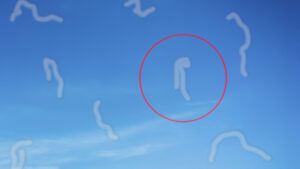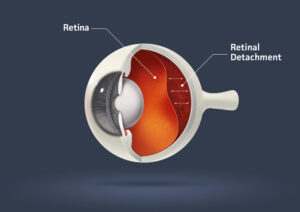If you experience Flashes of light in your vision or notice spots you may be wondering what these are and what does it mean.
Floaters or spots in your vision may appear as black, white or even translucent spots or strands. These will generally just appear overnight and are more visible if you are looking at the sky or a white wall. As you look around they will move with your line of sight. Over time you may notice more of these floaters and they can become quite frustrating if they are sitting in your direct line of sight. Over time you will adjust to not notice them as much as they blend into the background.

Why do I have Floaters in my vision?
Floaters are very small pieces of retinal tissue or proteins which float around in the vitreous humor, the jelly type substance in the middle of the eye. They can occur at any age and can occur as a natural process within the eye. They may also present after head trauma or other activities involving high velocity movements of the eye. High myopic (short sighted) patients are more at risk of developing flashes and floaters. In these cases the eye is more stretched and elongated which thins the retinal tissue leaving it more at risk of tearing.
With increasing age the Vitreous humor becomes less viscous and shrinks which can cause the vitreous to detach from the retinal tissue. This is considered to be a normal part of the ageing process.
What do Flashes in my vision mean?
Flashes in your vision may appear as lightening bolts in your side vision. You may think someone has turned a light on and off or there is an electrical storm with lightening. They are generally more noticeable at night in darker environments.
Flashes can occur when the vitreous humor pulls on the photoreceptors of the retinal tissue. The vitreous humour can pull on the retinal tissue and cause it to tear. A retinal tear can result in a flap of retinal tissue coming loose and triggering a flash in the vision. A retinal tear can allow fluid to enter behind the retina resulting in a retinal detachment. A Retinal detachment becomes a more serious situation which if not treated quickly can result in a permanent reduction in vision. If the Macula which provides the central vision is involved and becomes detached the final outcome may be quite poor.

If you experience any new floaters or flashes of light in you vision you should have an assessment with an Optometrist or health professional to see if any further monitoring or treatment is required.
What treatment is available if I have Floaters or Flashes?
An assessment by an Optometrist or Ophthalmologist is essential if you experience new Flashes or Floaters in your vision. An assessment will involve a Dilated Fundus examination where drops are put into the eyes to make your pupils bigger. This allows for a thorough assessment of the retina to determine the extent of any damage.
For floaters, not too much can be done to remove them. They will generally remain stable and can sometimes break up and become less noticeable. In more severe cases a special YAG laser can be used in a procedure called Vitreolysis to break up the floaters. However this has its own risks and may cause Cataracts, retinal tears, retinal detachments and even Glaucoma. A Vitrectomy is another option in severe cases of Floaters. In this procedure the Vitreous humor is removed and replaced with fluid. This is a more invasive option and is normally avoided due to the risk of Macula holes, Retinal detachments and lens damage.
Retinal tears are normally lasered to seal off any holes in the retina. This helps to prevent the retinal tear from progressing to a retinal detachment.
Retinal Detachments can be lasered if small and detected early. Treatment may also include vitrectomy and a scleral buckle.

Pingback: Why is my vision cloudy? – My Eye Guide